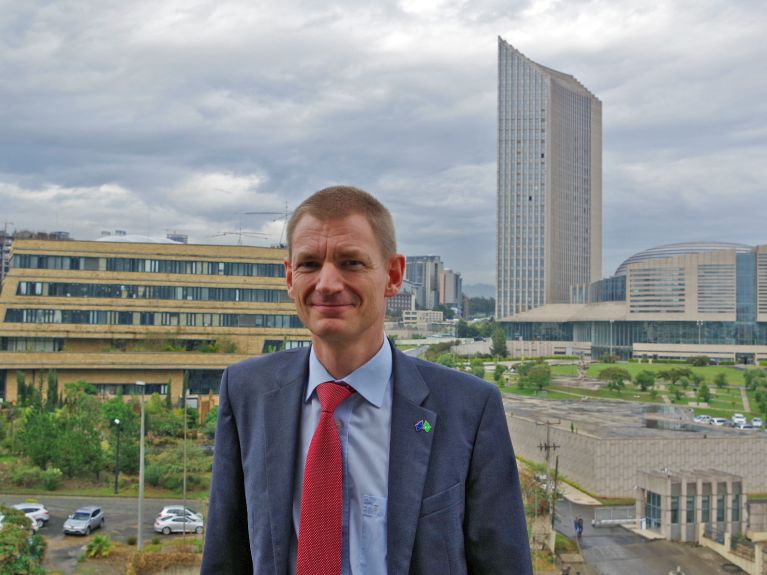“Broad-based partnership”
How do the European Union and Africa work together? Thorsten Clausing is familiar with everyday working practices.

Mr Clausing, you head the “Political, Press and Information Section” of the EU delegation attached to the African Union (AU) in Addis Ababa. What is work like at the cooperation interface?
As with every political department in an EU delegation, a key part of our work consists of observing and reporting on developments in our “guest country”, i.e. the African Union. Part of this, and wholly consistent with the idea of the EU-African partnership, involves always looking to see where and how our two organisations can work together to achieve joint goals, for instance by making joint or coordinated statements. Moreover, we are of course involved in preparing and realising the various EU-AU events. In addition to joint summits and ministerial meetings, there are annual members’ meetings of the European Commission and the AU Commission, as well as of the Peace and Security Council of the AU and of the EU’s Political and Security Committee.
The last summit between the African Union and European Union took place in 2017. What progress has been made since then?
A great deal, indeed the EU-African partnership is very broad based in terms of content, as the summit again confirmed, and encompasses numerous joint projects. To give one example: The AU-UN-EU task force for migrants stranded in Libya was set up at the summit. It has helped more than 16,000 people out of dire straits and in so doing demonstrated how the EU and AU can successfully tackle a pressing problem together and provide real help to those affected. Moreover, the Africa-Europe Alliance for Sustainable Investment and Jobs, which European Commission President Juncker launched in September 2018, directly addresses the central topic of the summit, namely creating better training and employment opportunities for young people. The first EU-AU foreign ministers’ meeting, which took place in Brussels in January 2019, highlighted the importance of this alliance for the implementation of summit decisions.
It is certainly justified to cite the EU as Africa’s number-one partner.
Other countries such as the USA, China and Japan are also active on the African continent. How would you describe the role of the EU on an international comparison?
More than a third of African foreign trade is transacted with the EU, 40 percent of foreign direct investment in Africa comes from the EU, and more than half of all funds for development cooperation with Africa are supplied by the EU and its member states. These figures for the EU are higher than those for the three abovenamed partners taken together. As such it is certainly justified to cite the EU as Africa’s number-one partner. The EU is strongly involved on a bilateral level with African states, at the sub-regional level with organisations such as ECOWAS, the Economic Community of West African States, and at the continental level with the AU. That sets us apart from partners like China or Japan, whose overall commitment, although they also cooperate with the AU, is strongly focussed on bilateral cooperation with African states.
You can observe Ethiopia’s development practically from your doorstep. Can the country be considered a role model?
The country’s new head of government Abiy has introduced some impressive changes since taking office 12 months ago. He has launched comprehensive reconciliation processes at both the regional and the national level. Nonetheless, the challenges facing Ethiopia remain enormous. There continue to be considerable tensions between the various ethnic and political groups, and as yet no peaceful solution has been tabled.
Interview: Martin Orth
You would like to receive regular information about Germany? Subscribe here:


